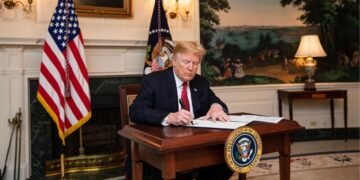U.S. Defense Secretary Pete Hegseth and Chairman of the Joint Chiefs of Staff, Gen. Dan Caine, held a closed-door meeting on Thursday evening with Nigeria’s National Security Adviser, Mallam Nuhu Ribadu, at the Pentagon—an engagement seen as crucial in stabilising U.S.–Nigeria security cooperation following former President Donald Trump’s recent threats to deploy American troops to Nigeria.
Two U.S. defence officials confirmed the meeting, which did not appear on the public schedules of either Hegseth or Caine. Ribadu’s arrival at the Pentagon was also not open to the press, underscoring the sensitivity of the discussions.
Although the Department of Defense—now repeatedly referred to by Hegseth as the “Department of War”—declined to comment on the agenda, senior security sources familiar with the meeting said Mal. Ribadu sought to reinforce Nigeria’s partnership with the United States and to provide clarity on the country’s counterterrorism operations.
The session reportedly focused on strengthening intelligence sharing, expanding joint training for Nigerian forces, and addressing U.S. concerns fuelled by misinformation about religious persecution in Nigeria.
Ribadu, according to officials briefed on the meeting, highlighted Nigeria’s ongoing efforts to dismantle insurgent and criminal networks across the North East and North West, and emphasised that collaborative counterterrorism efforts—not unilateral foreign intervention—remain the most effective path.
Nigeria has already rejected its designation as a “country of particular concern,” insisting that the label was driven by faulty data. President Bola Ahmed Tinubu reiterated that position, stressing that the portrayal of Nigeria as religiously intolerant “does not reflect our national reality,” and fails to acknowledge the government’s consistent work to uphold freedom of religion and belief.
Security observers say Ribadu’s outreach—which comes at a delicate diplomatic moment—helped reaffirm Nigeria as a reliable partner to Washington, ensured continuity in defence cooperation, and countered escalating political rhetoric suggesting U.S. military action.

































